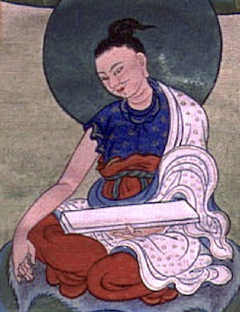Praise of Candragomin
The Swift Infusion of Blessings
In Praise of the Mahāpaṇḍita Candragomin
by Jamyang Khyentse Chökyi Lodrö
Homage to Mañjughoṣa!
In the forever peaceful dharmadhātu,
You are already liberated and awakened,
Yet still you appear once again in this realm
In a wisdom form with knowledge and love.
The maṇḍala of your signs and marks is fully developed,
Your speech resonates with the sixty melodious tones,
And your mind has the character of transcendent wisdom—
Mañjughoṣa guru, I bow down before you.
Opponent of ordinary substantial phenomena,
Keeper of the treasury of sections of Dharma,
One whose identity is the definitive ultimate,
To you who defy the imagination, I pay homage.
Your loving face glows like a hundred moons
All full of compassion towards beings
And adorned with the rabbit mark of bodhicitta—[1]
To you who bestow the ambrosia of benefit and happiness, I bow.
Your fine form with its pure, brahma-like conduct,[2]
Which is entirely consistent and without duplicity,
Emits the sweet fragrance of ethical discipline—
To you who are magnificent at observing vows, I bow down.
You reside on an island amidst the ocean of learning,
Are arrayed in the jewel ornaments of the meditative,
And possess the hood of scripture and reasoning—
To you, a second Nāgārjuna, I pay homage.
The three families and Tārā, your yidam deity,
Appeared to you directly time and again,
And you discussed the profound and vast Dharma—
To you who cut through the web of doubt, I bow.
Countless scholars of the noble land
Bowed down at your feet in reverence
And through a portion of your teaching
Unlocked the treasure of courageous eloquence—to you I bow.
You dispelled the wicked attacks of arrogant disputants,
And raised aloft the umbrella of the genuine teachings.
Who else but you could count as the famous moon
In the sky of the profound and vast Mahāyāna?
You beautified the three worlds
With the noble Asaṅga’s views and works.
And as an immaculate, day-making sun,
Set out the path uniting view and conduct.
Your treatises with their excellent explanations
Of all outer and inner branches of knowledge
Will remain as the unique vision of the learned
Without ever fading, even until the aeon’s end.
Fully trained in the path of the two stages,
At the supreme level of no-further-training,
You are the all-pervasive, all-perfect dharmakāya—
To you, the mighty Vajradhara, I bow.
As we who have faith in you
Play the many-stringed vīṇā of praise,
And thereby delight your wisdom mind,
Grant us the light of intelligence, I pray.
From now until I attain awakening,
As I follow you, my protector, without ever parting,
Cause the bright wisdom fire of twofold knowledge
To burn through the thicket of the obscurations, I pray.
Bring mastery in explanation, debate and composition,
Cause me to find certainty in the authentic view,
Unlock a hundred doors to wondrous courage and eloquence,
And grant me the attainment of perfect victory over all.
These verses of praise and prayer to the great upāsaka and marvellous ācārya[3] Candra were composed by one who was intrigued by his life story and inspired with faith, Shönnu Mañjughoṣa Dharmamati. May virtue and goodness abound!
| Translated by Adam Pearcey with the generous support of the Khyentse Foundation and Tertön Sogyal Trust, 2020.
Bibliography
Tibetan Edition
'Jam dbyangs chos kyi blo gros. "ma hA paN+Dita tsan+d+ra go mi la bstod pa byin rlabs myur 'jug/" in ’jam dbyangs chos kyi blo gros kyi gsung ’bum. 12 vols. Bir: Khyentse Labrang, 2012. W1KG12986 Vol. 2: 533–535
Version: 1.2-20250220
-
This refers to the rabbit-shaped area that is visible within the moon — which led the Indians to coin the term 'rabbit bearer' (śaśadhara) as a synonym for the lunar orb. ↩
-
brahmacarya, i.e., celibacy. ↩
-
Candragomin is sometimes counted as one of 'two marvellous ācāryas' (rmad byung gi slob dpon gnyis), the other being Śāntideva. ↩
